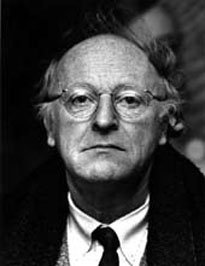| Joseph Brodsky  AKA Iosif Alexandrovich Brodsky AKA Iosif Alexandrovich Brodsky
Born: 24-May-1940
Birthplace: St. Petersburg, Russia
Died: 28-Jan-1996
Location of death: Brooklyn, NY
Cause of death: Heart Failure
Remains: Buried, Cimitero di San Michele, Venice, Italy
Gender: Male
Religion: Jewish
Race or Ethnicity: White
Sexual orientation: Straight
Occupation: Poet Nationality: United States
Executive summary: "Social parasite" turned Poet Laureate "The surest defense against evil", said Russian-American poet Joseph Brodsky, "is extreme individualism, originality of thinking, whimsicality, even — if you will — eccentricity." Most of his lyric and elegiac poems were not overtly political, but his work dealt with matters of life, love, death, and the meaning of it all, with an undeniable spirit of freedom. These qualities were not at all welcome in his native country, the Soviet Union, where even poetry and literature was expected to subservient to the state.
He was born in Leningrad (now St Petersburg, Russia) and survived the Nazi siege of Leningrad as a child. His father was a military photographer, his mother a secretary, and he quit school at the age of 15, bored with omnipresent portraits of Lenin and classes that felt like mere indoctrination. He worked without enthusiasm as a mill machine operator, a boiler room stoker, and in a morgue, and began writing poetry as a young man. He taught himself to read and write in foreign languages, ostensibly so he could work as a translator, but more to the point so he could read the writings of banned Western authors.
He was twice briefly committed to psychiatric institutes, a common Soviet response to nonconformity, and he was charged as a laggard at the age of 24. "Who enrolled you in the ranks of poets?" the judge asked the high school drop-out, and Brodsky replied, "Nobody. Who enrolled me in the ranks of mankind?" He was convicted of shirking his "constitutional duty to work honestly for the good of the motherland", and sentenced to five years at an Arctic labor camp. Complaints from International PEN and pleas some of the world's more distinguished literary figures, including Anna Akhmatova and Jean-Paul Sartre, saw his sentence commuted after a year a half, but his harassment continued after his release.
Most of Brodsky's work was published as samizdat in the USSR or first published abroad, and he was not allowed to travel freely, nor to marry his lover, the mother of his son. In 1972 he was expelled from the Soviet Union, becoming effectively a man without a nation. He immigrated to America, where he became a citizen in 1977, and lived and taught for the rest of his life. When he grew especially homesick, he occasionally drove to the northlands of Canada, where he could receive staticky broadcasts from Russian radio stations.
He won a MacArthur "genius" grant in 1981, the Nobel Prize in 1987, and served as the poet laureate for the US Library of Congress from 1991-92. In his Nobel lecture he proposed that totalitarian states could not exist if leaders were selected by what books they had read. "I'll just say that I believe — not empirically, alas, but only theoretically — that, for someone who has read a lot of Dickens, to shoot his like in the name of some idea is more problematic than for someone who has read no Dickens."
He was the youngest Nobel laureate in Literature, only 47 years old when the honor was presented, but he was a heavy smoker, and suffered fading health. He grew too frail to easily travel overseas, so even after the Soviet Union collapsed in 1991 he never visited Russia. He died of a heart attack in his Brooklyn apartment in 1996, and was buried in Venice, Italy. Father: Alexander Brodsky (Navy photographer)
Mother: Maria Volpert (office worker)
Girlfriend: Marianna Basmanova (artist, one son)
Son: Andrei Basmanova (b. 1965)
Wife: Maria Sozzani (m. 1990 until his death, one daughter)
Daughter: Anna Maria Alexandra ("Maria", b. 9-Jun-1993)
Scholar: Poet-in-Residence, University of Michigan, Ann Arbor (1972-80)
Professor: Cambridge University
Professor: Columbia University
Professor: Mount Holyoke College
Professor: Queens College New York
Professor: Smith College
US Poet Laureate (1991-92)
Mondello Prize 1979
MacArthur Fellowship 1981
National Book Critics Circle Award 1984, for Less Than One
Guggenheim Fellowship 1987
Nobel Prize for Literature 1987
Academy of American Poets
American Academy of Arts and Letters
International PEN
Social Parasitism Five years labor, 1964-65 (commuted)
Exiled from Soviet Union, 4-Jun-1972
Naturalized US Citizen 1977
Open Heart Surgery 1979
Heart Bypass Operation
Heart Bypass Operation 1987
Heart Attack 28-Jan-1996 (fatal)
Jewish Ancestry
Russian Ancestry
Risk Factors: Smoking
Author of books:
Selected Poems (1973, poetry, trans. George L. Kline)
A Part of Speech (1980, poetry)
History of the Twentieth Century (1986)
To Urania (1988, poetry)
Less Than One (1986, essays)
Watermark (1992, essays)
On Grief and Reason (1996, essays)
So Forth (1996, poetry)
Collected Poems in English (2000, poetry)
Nativity Poems (2001, poetry)
Requires Flash 7+ and Javascript.
Do you know something we don't?
Submit a correction or make a comment about this profile
Copyright ©2019 Soylent Communications
|